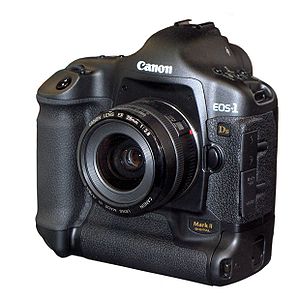Canon EOS-1Ds Mark II
 |
|
| Overview | |
|---|---|
| Type | Single-lens reflex |
| Lens | |
| Lens | Interchangeable (EF) |
| Sensor/Medium | |
| Sensor | 36 mm × 24 mm CMOS |
| Maximum resolution | 4,992 × 3,328 (16.6 million) |
| ASA/ISO range | 100–1600 in 1/3 stops, plus 50, 3200 as option |
| Storage | CompactFlash (Type I or Type II) and/or Secure Digital (SDHC) |
| Focusing | |
| Focus modes | One-shot, AI Servo, Manual |
| Focus areas | 45 AF points |
| Exposure/Metering | |
| Exposure metering | 21-zone TTL full aperture metering |
| Metering modes | 21 area eval, partial, spot (center, AF point, multi-spot), center-weighted average |
| Shutter | |
| Shutter | Electronically controlled focal-plane |
| Shutter speed range | 1/8000 to 30 s (1/3-stop increments), bulb, X-sync at 1/250 s |
| Continuous shooting | Approx. 4.5 frame/s |
| Viewfinder | |
| Viewfinder | Optical |
| General | |
| Rear LCD monitor | 2.0 inch, 230,000 pixels |
| Battery | Ni-MH battery pack |
| Weight | 1,215 g (42.9 oz) (body only) |
| Made in | Japan |
| Chronology | |
| Released | November 2004 |
| Replaced | Canon EOS-1Ds |
| Successor | Canon EOS-1Ds Mark III |
The EOS-1Ds Mark II is a digital SLR camera body introduced by Canon Inc. in 2004. It was the top model in the Canon EOS line of digital cameras until April 2007, with a full-frame 16.7 megapixel CMOS sensor. The EOS-1Ds Mark II had the highest pixel count available in a 35mm format digital SLR at the time of its introduction until its successor was announced in August 2007. It uses the EF lens mount. The EOS-1Ds Mark II is a professional grade camera body and is large, ruggedly built, and dust/weather-resistant.
Being an autofocus camera, it has multiple autofocus modes and uses a 45-point autofocus system, and an option for manual focusing. Its viewfinder is a "fixed pentaprism". It also has a 2", TFT color LCD. Its dimensions are 156 mm in width, 157.6 mm in height, and 79.9 mm in depth (6.14 in × 6.20 in × 3.15 in). Its mass (without a battery) is 1,215 grams (42.9 oz).
The camera's image sensor is a single-plate CMOS-based integrated circuit, 24 mm × 36 mm in size; the same as 35mm film. It has approximately 17.2 million total photosites (16.7 million effective pixels in the final output). It uses a RGB primary color filter.
The shutter is an electronically controlled focal-plane shutter. Its maximum speed is 1/8000 of one second and it is rated for 200,000 actuations. Soft-touch shutter release occurs via electromagnetic signaling.
On 20 August 2007, Canon announced the successor to the Mark II: the Canon EOS-1Ds Mark III.
...
Wikipedia
